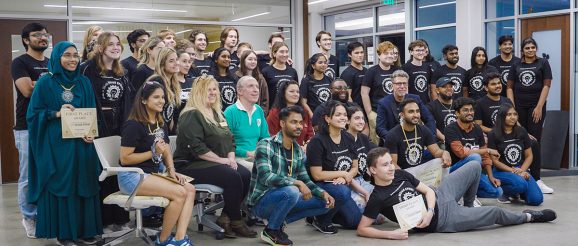FSU Innovation Hub hosts 24-hour design sprint to develop solutions for human trafficking – Florida State University News

Florida State University students from various disciplines gathered Friday, Jan. 26, and Saturday, Jan. 27, at the Innovation Hub for a 24-hour design sprint, an intensive problem-solving session where students work in teams to develop solutions to real-world problems. This year’s event was in partnership with the FSU Center for the Advancement of Human Rights and focused on human trafficking prevention in recognition of Human Trafficking Awareness month. Through teamwork and design thinking, a process taught by the FSU Innovation Hub, students created innovative solutions to answer, “How might we raise awareness of the human trafficking problem, call attention to the victims and place pressure on offenders to reduce the incidents of human trafficking?” This was the third edition of the 24-hour design sprint. “These events have been the highlight of my 26 years of teaching at FSU. I see them as the future of higher education,” said Ken Baldauf, founding director of the Innovation Hub. “They connect knowledgeable faculty and industry experts with students to explore current issues, practice research and innovation techniques, design solutions and have a real impact on the world — all in an intense 24 hours.” The design sprint began with a presentation by Terry Coonan, executive director of Florida State University’s Center for the Advancement of Human Rights, followed by a panel discussion with other human trafficking experts. “Human trafficking is one of the world’s most brutal human rights violations and at times even difficult to put into words,” Coonan said. “It was a privilege to share the stories and experiences of many of the trafficking survivors that our FSU Center for the Advancement of Human Rights has served over the years. And the passion and creativity that our students brought to the task of combating this atrocity was inspiring.” After the presentation, students were split into interdisciplinary teams to research the problem further and create actionable steps toward solving the human trafficking crisis. The teams pitched their ideas to a panel of judges to win a portion of the $4,000 prize pool. Team Unshackled came in first place, and each of the five members — Tazmeen Alam, Mohd Ashif, Mohit Kulkarni, Farhana Taiyebah and Mani Tyagi — were awarded $400. Their solution involved a browser extension app that informs the user at the point of purchase if forced labor was used in the manufacturing of the products being purchased. “Participating in the 24-hour design sprint on human trafficking was an impactful experience on both a personal and collaborative level,” Taiyebah said. “As someone originally from Bangladesh, where forced labor fuels fast fashion, I have witnessed the harsh realities firsthand. Our team brought empathy, creativity and determination to unveil the hidden exploitation within the industry.” Alam reflected on the “eye-opening experience” that pushed her beyond her limits. “The challenge was not thinking of an idea, but thinking of a new, innovative, and practical idea that could be articulated to the judges and the audience in a short span of time,” Alam said. “This was possible only because we worked together as a team, putting in smart efforts to tackle problems and finding the best solutions by optimizing our research methods.” Team Hidden Heros placed second for a solution to identify potential domestic abuse through a school activity for third- to fifth-grade students. In the proposed plan, students could read or watch stories about superheroes and villains and take a quiz intended to reveal hidden sentiments linked to abusive situations. Members of the second and third-place teams were each awarded $200. Interested students can further their research through Baldauf’s class “Systems Innovation by Design,” where they can spend the semester mapping out the underlying system that supports human trafficking, identifying areas where they can make a difference and developing initiatives to reduce the incidents of human trafficking. For more information, visit innovation.fsu.edu.
